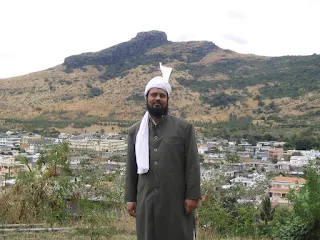 In his Friday Sermon of October
21, 2011 Khalifatullah
Hadhrat Munir Ahmad Azim Sahib continued the subject of
Islamic prayer and reflected upon the psychological benefits of Salat.
In his Friday Sermon of October
21, 2011 Khalifatullah
Hadhrat Munir Ahmad Azim Sahib continued the subject of
Islamic prayer and reflected upon the psychological benefits of Salat.
Beyond the psychological benefits
to the human body and mind, Salat offers the real possibility of expressing the
true yearning of the human heart and soul to reach the Divine presence, points out the Chosen Messenger of our times.
Read the
extracts from the Sermon:
Allah has said:
“Whoever shows enmity to a friend (servant) of Mine, I
shall be at war with him. My servant does not draw near to Me with anything
more loved by Me than the religions duties I have imposed upon him, and My
servant continues to draw near me with Nawafil so that I shall love him. When
I love him I am his hearing with which he hears: his seeing with which he sees,
his hand with which he strikes, and his foot with which he walks. Were he
to ask something of Me, I would surely give it to him. And were he to ask refuge,
I would surely grant it to him.” (Bukhari)
What is implicit in this
Hadith is that man can transcend the space time barrier and acquire the attributes of
divinity, to control his entire environment. This means that he can, by
following the Sunna, insures
both physical and mental health not only for himself but will also effect
changes in his environment. This is the meaning of the successes of all Muslims
and the source of their dynamism.
Prayer said with utmost humility and tenderness of
heart becomes special prayers, just like a suckling who cannot speak can attain
utmost kindness of the mother by weeping, in the same manner the Duah with tears and utmost humility is the most effective
way to communicate with God.
There has been sent down an extremely effective,
healing and beneficial medicine, from the heaven of mercy. It is easily
available in one sense, but rare in another. It appears to be common, but is
the most special. It is beyond our description and praise, because it is
universal remedy for thousands of diseases. Such a miraculous medicine is Salat, and duah. Prayer is the yearning
of the heart to be one with the Creator and an invocation for His blessings.
The study and reflection
on the Qur’anic prayers shows that the most common element is the use of words
of praise, the praise of God is a prescription for man, which brings him nearer
to God.
Deeper understanding of the Qur’anic concept of man
and God shows that there is one single straight line, which we may call aim.
The line represents the line of life of any being, the upper end is God and the
lower end is man. Though the line is one, yet it is unlimited at the upper end,
and limited at the other. The innermost
yearning of life is to see the end brought together. When man invokes the name
of God, man forgets his limitation and sublimates his self with the thought of
the unlimited. In the Quran Almighty Allah announces:
“When My servant questions you, concerning Me, then
surely I am near. I answer the prayer of the suppliant when He calls Me.” (2:187).
According to the Holy
Quran, the purpose of the creation of jinn and mankind is the worship of God,
and according to an authentic Hadith, the essence of worship is prayer. Prayer
is understood as human communication with God.
Prayer is a practical worship, in which, the believer
presents his needs in the presence of God, the Blessed and Exalted, with utmost
humility to attain Allah’s mercies and blessings. While the Lord of the world
is All-sufficient, man is extremely needy.
The fruit of “Iyyaka Nabudu” (1: 5) – You
(alone) we worship – is attained in “Iyyaka
Nasta’iin” (1: 5) – You (alone) we ask for help. This is an example
through which we can be sure that a special reward of worship is received in
the form of acceptance of prayer and divine help.
Here a question may be
asked: How many times should the name of
God be recited? The answer to this question is given in the Holy Quran: “those who remember God standing and sitting and lying
on their side” (3: 192) it means that the
prayer and remembrance of Allah should be at all times, so the heart of the
true believer be illuminated with that light of heart, through which he can
realise the purpose of creation and at last his faith becomes pure and complete
and with that complete faith, he says God is truth.
Another advice of the
Quran is that prayer and remembrance of God
should be done with the tongue of soul, with humility and fear, in a low voice
(7: 206), only then, can it enter the heart
and become effective. There are many signs of the efficacy of this luminous
medicine. The best signs are the shedding of tears with sincerity and prostrations
are most liked by God….”.